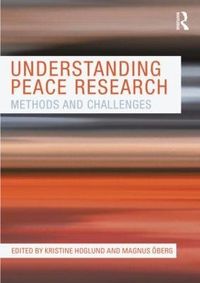
spara 39%
5+ säljare
Understanding Peace Research
This textbook provides a comprehensive overview of different methods and sources of information-gathering for peace and conflict students and researchers, as well as the challenges presented by such work.
Research on conflict-ridden societies carries special challenges for the collection and evaluation of information about the conflict and its actors. First, due to the nature of information emerging, incentives to misrepresent and propaganda is common. News coverage is sometimes poor and reporting is often incomplete, selective and biased. Second, the sensitivity of the topic and the questions posed in peace and conflict research means that access to and the security of informants can be a problem.
Peace and conflict research as a discipline encompasses a number of different approaches for obtaining empirical information which serve as a basis for analyzing various research topics. This book provides a comprehensive overview of different methods and sources of information-gathering for students and researchers, as well as the challenges presented by such work. It offers:
tools for evaluating sources and information
suggestions on where different types of information can be found
advice on using different types of sources, including news reports and written narratives
practical guidelines for constructing large-scale datasets
insights and guidelines for comparative fieldwork, in-depth interviews, focus groups, and surveys
reflection and discussion on important ethical concerns in peace researchThis book will be of much interest for students and researchers of peace and conflict studies, conflict resolution, war and conflict studies, development studies, security studies and IR, as well as for NGO workers/researchers.
Kristine Höglund is Associate Professor at the Department of Peace and Conflict Research, Uppsala University. She has a PhD in Peace and Conflict Research from Uppsala University Sweden (2004). She is author of Peacemaking in the Shadow of Violence.
Magnus Öberg is Associate Professor at the Department of Peace and Conflict Research, Uppsala University, and Associate Editor of the Journal of Peace Research (since 2006). He has a PhD in Peace and Conflict Research from Uppsala University (2003) and is co-editor of Resources, Governance, and Civil Conflict (Routledge, 2008).
Utgiven: 2011
ISBN: 9780415571982
Förlag: Routledge
Format: Häftad
Språk: Engelska
Sidor: 228 st
This textbook provides a comprehensive overview of different methods and sources of information-gathering for peace and conflict students and researchers, as well as the challenges presented by such work.
Research on conflict-ridden societies carries special challenges for the collection and evaluation of information about the conflict and its actors. First, due to the nature of information emerging, incentives to misrepresent and propaganda is common. News coverage is sometimes poor and reporting is often incomplete, selective and biased. Second, the sensitivity of the topic and the questions posed in peace and conflict research means that access to and the security of informants can be a problem.
Peace and conflict research as a discipline encompasses a number of different approaches for obtaining empirical information which serve as a basis for analyzing various research topics. This book provides a comprehensive overview of different methods and sources of information-gathering for students and researchers, as well as the challenges presented by such work. It offers:
tools for evaluating sources and information
suggestions on where different types of information can be found
advice on using different types of sources, including news reports and written narratives
practical guidelines for constructing large-scale datasets
insights and guidelines for comparative fieldwork, in-depth interviews, focus groups, and surveys
reflection and discussion on important ethical concerns in peace researchThis book will be of much interest for students and researchers of peace and conflict studies, conflict resolution, war and conflict studies, development studies, security studies and IR, as well as for NGO workers/researchers.
Kristine Höglund is Associate Professor at the Department of Peace and Conflict Research, Uppsala University. She has a PhD in Peace and Conflict Research from Uppsala University Sweden (2004). She is author of Peacemaking in the Shadow of Violence.
Magnus Öberg is Associate Professor at the Department of Peace and Conflict Research, Uppsala University, and Associate Editor of the Journal of Peace Research (since 2006). He has a PhD in Peace and Conflict Research from Uppsala University (2003) and is co-editor of Resources, Governance, and Civil Conflict (Routledge, 2008).
Begagnad bok
469 kr760 krSpara 291 kr (39%) mot nypris
Fri frakt & skickas inom 1-3 vardagar
Köpskydd med Studentapan
Varje köp täcks av Studentapans köpskydd som säkerställer att boken kommer fram, att du får rätt bok och att skicket stämmer överens med beskrivning.



